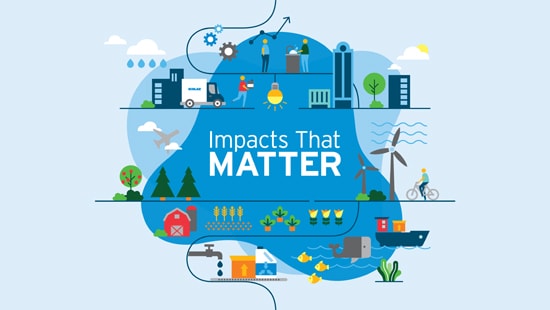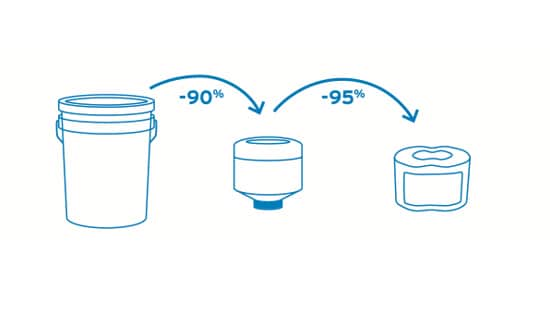
Product Sustainability
Ecolab is on a continuous journey to be a leader in product safety and sustainability. Our policies and programs have been developed to protect what is vital – People Health, Planet Health and Business Health.
When it comes to our products, we consider the total impact on both human health and the environment. Our Impacts That Matter criteria and packaging principles help ensure that Ecolab products are designed with sustainability in mind without compromising safety or performance.
Ecolab is a leader in the industry in developing new, effective solutions that help our customers drive operational efficiency, product quality, safety and compliance while minimizing environmental impact throughout a product’s lifecycle.
Sustainable Design Principles
Ecolab designs products for maximum positive impact. Our primary objective is to help customers achieve significant sustainability, safety and productivity gains in their own operations, while minimizing the footprint of the products we deliver. Everyone at Ecolab shares this responsibility, and the foundations of sustainable design are embedded into our Research and Development processes.
Chemical Management
Ecolab’s product sustainability programs are built in partnership with regulatory affairs teams to go beyond regulation to help ensure best practices in chemical footprint management. Ecolab participates in the Chemical Footprint Project (CFP), which measures business progress toward safety chemicals and provides a tool for benchmarking companies as they select safer alternatives and reduce their use of chemicals of high concern.
Ecolab is proud to have been awarded CFP Frontrunner status in 2024 by scoring high across four pillars of chemical safety: management strategy, chemical inventory, footprint measurement and disclosure and verification.
Packaging Goals
Ecolab is committed to ensuring that our products and packaging advance safety and sustainability. We continuously improve our designs to help minimize waste and safely deliver best-in-class experiences for our customers. Our commitment to excellence in packaging is supported by a global team of more than 50 packaging professionals, including engineers, materials scientists, analysts and technicians.
By 2030, our ambition is to have moved to reusable or recyclable-by-design packaging for non-regulated products. Currently, 91% of Ecolab’s packaging by weight is reusable or recyclable-by-design.

Reducing Plastic Waste
- In 2024, we launched Ecolab’s Disinfectant 1 Wipe, the first EPA-registered plastic-free1, readily degradable disinfectant wipe, derived from wood pulp fibers.2
- In 2024, we launched Ecolab® ReadyDose™, a tablet-based cleaning program with a 98.8% reduction in plastic packaging waste.3
- Aligned with circular economy principles, Ecolab continues to deliver virgin plastic resin avoidance. In 2024, we avoided 15.9 million pounds of virgin plastic resin. This impact represents 15% of Ecolab’s total plastic packaging by weight.
- We have a long history of pioneering packaging technology. For example, our SmartPower™ technology reduces plastic use by up to 99%, as compared to traditional packaging, by replacing five-gallon plastic pails with shrink-wrapped blocks.
- We were an early adopter of reusable containers for our concentrate products, as well as in the incorporation of post-consumer recycled plastic resin (PCR) into many of our packages. For nearly two decades, our SolidPower™ XL capsule has contained 40% post-consumer resin.
- We pursue our plastic waste ambitions through:
- Reduction: Packaging with reduced plastic content and concentrated product alternatives with lower plastic packaging.
- Reuse: Packaging reuse and purchase of reconditioned plastic containers and IBCs/totes.
- Recycling: Incorporation of post-consumer recycled (PCR) materials into packaging.
- Wipe substrate is plastic free. Soft pack packaging comprised of plastic. Represents a 90%+ reduction in total plastic compared to the total plastic mass of a wipe canister containing 160 plastic wipes.
- Disinfectant 1 Wipe, EPA Reg. No. 1677-263, refer to product label for use directions.
- Reduction in plastic waste is an approximation based on customer use of all six Ecolab ReadyDose products, assuming use of one case of each product per month over 12 months, compared with the equivalent use of Ecolab liquid products, which is enabled by the smaller, lighter package size for solid tablets.
Discover Ecolab’s commitment to sustainable packaging by accompanying Nevin Sant on a tour of Ecolab’s Water University at our Naperville Campus. Nevin shares key insights into Ecolab’s circular packaging strategy and 2030 ambition to move to reusable or readily recyclable materials in our non-regulated packaging. Ecolab will continue to incorporate post-consumer recycled materials in our packaging where feasible without compromising user safety or performance.

Regulatory
Our regulatory teams, processes, policies and practices are the foundation for keeping our customers and business ahead of ever-changing regulations.
Ethical Sourcing
Our suppliers are held to global fundamental principles of human dignity. Our Ethical Sourcing Standards are the foundation of our global supply chain initiative, requiring our direct suppliers to protect the health, safety and human rights of their associates.
Palm Oil Sourcing
Ecolab does not directly purchase palm oil or palm oil derivatives. However, any supplier partners providing palm derived material are members of Round Table on Sustainable Palm Oil (RSPO), to ensure sustainable and responsible sourcing.
Conflict Minerals
Ecolab supports human rights organizations to end violence and atrocities in Central Africa, specifically the Democratic Republic of the Congo (DRC) and nine adjoining countries.
Supplier Sustainability
Our suppliers have always been part of our sustainability strategy, which is why we are collaborating with suppliers to help us reduce our absolute Scope 3 emissions by 25% from a 2022 base year of purchased goods and services, fuel and energy related activities, upstream transportation and distribution, and downstream leased assets.


